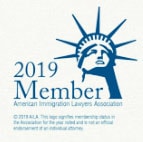Adjustment of status is the term given by American immigration officials to the process whereby foreigners become lawful immigrants who qualify for benefits such as conditional or permanent residency. In some family-based immigration cases, foreigners can adjust their status upon arrival to the United States. For the most part, there’s an expectation that applicants have completed a period of permanence according to visa conditions and won’t be forced to return to their countries of origin to wait for approval.
According to the Cato Institute, the overall immigration application denial rate has significantly increased under the Trump administration. From 2017 to 2018, the denial rate of I-485 Adjustment of Status applications based on employment jumped from 6 to 8 percent. The denial rates for marriage and family-based applications, respectively, stood at 21 and 13 percent. It should be noted that First Lady Melania Trump completed an I-485 application after marrying the President in 2005. Higher denial rates can be attributed to more stringent policies, but they can also be caused by higher scrutiny, greater incompetence, and understaffing. Here are five reasons your adjustment of status could be denied.
1. Bureaucratic Incompetence
It’s not uncommon to see immigration adjudicators make errors, particularly with regard to document review and filing charts. An example would be a supporting document missing from the I-485 checklist, which could be anything from certified police records for a traffic infraction to passport-style photos. Another example would be an application rejected because it was submitted outside the dates listed on filing charts. If you’re sure there were no mistakes on your part, contact an immigration law firm to start the rectification process. Reach out right away to lawyers with specialized expertise in immigration services. In San Diego, the experienced immigration attorneys from KS Visa Law will be your trusted partners through every step of the process.
2. Inadmissibility Determinations
In some cases, applicants may be deemed inadmissible despite having been previously admitted without issue. The burden is on immigration adjudicators to make a distinction between ineligibility and inadmissibility, but the burden to prove otherwise is on the applicant. The problem with this determination is that it can escalate into deportation, which means you must seek immigration counsel to help you.
3. Missed Appointments
Failure to show up for interviews or fingerprinting sessions could also result in application denials. However, if the missed appointments were rescheduled, an immigration attorney may be able to bring this to the attention of adjudicators.
4. Violation of Visa Conditions
Having previously overstayed a visa term often results in a denial of immigration benefits. When the I-485 form contradicts previous immigration records, you can expect a denial.
5. Public Charge Determination
In August 2019, the Trump administration announced new rules that would prevent immigrants who have previously received Medicaid and SNAP benefits from becoming permanent residents. These rules, which are expected to go into effect in October, will augment the current provisions that allow adjudicators to reject adjustment of status if they feel an applicant could become a public charge in the future.
People who are concerned about having their adjustment of status denied should contact the San Diego immigration lawyers from KS Visa Law to review their situations and discuss their options. We have helped many people work through the system to become lawful immigrants. Call us today at 858-874-0711 to schedule an appointment.




